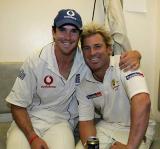No hard feelings, mate: the beer is back
Derek Pringle
|
|

|
Besides the thrilling cricket and the bloody-minded brilliance of those involved in it, one of the triumphs of the 2005 Ashes series was that it appeared to resurrect dormant traditions on and off the field.
One of these, the post-match pint, was thought to have gone the way of the non-bending fielder, the genuine tailender, and other quaint anachronisms sacrificed upon the altar of professionalism. But the sight of Shane Warne sharing a beer with his many victims, and Ricky Ponting sinking a tinny with Gary Pratt, his nemesis at Trent Bridge and the world's most famous substitute fielder, was to return cricket to its natural order.
Cricket has always been a social game irrespective of the level played. And having a drink after play should not be confused with the bender enjoyed by Andrew Flintoff and some others in the aftermath of England's triumph, which like an Indian wedding, seemed to span several days and nights. No, we are talking about the quiet sup and chat with one's adversaries, often within the confines of the dressing room or a nearby bar, a ritual commonplace to most sides, outside Asia anyway, until the 1990s.
The constant drama, and the public's unquenchable thirst for it, seemed to create a very real one among the players. For those who prefer their sportsmen and women to possess the odd blemish of normality, it was a development almost as pleasing as the sportsmanship on show. The socialising helped strip away Australia's aura of invincibility, a condition fuelled by distance in the past but defused by the intimacy between the teams this time. It may even have played a part in the final result, and both Ponting and Glenn McGrath felt England had suffered by not fraternising with them on their previous tour to Australia. "When Nasser Hussain told the players not to come into our rooms last tour, I felt that was the worst mistake they could have made,'' said Ponting. "If they could have come in, they would have realised we are not the big bad wolves."
The ban on players mixing for a drink after play was actually introduced by Allan Border in 1989 after the Aussies had lost the previous two Ashes series. Their 16-year monopoly began immediately and with it, inevitably, imitation from England sides desperate to stop the one-way traffic. Somewhere along the line, though, the Australians' desire for a drink and a laugh after a long day began to exceed their will to win.
Not everyone can let bygones be bygones after a hard-fought game. On the 1982-83 Ashes tour, Derek Randall refused to fraternise with the enemy. "Them big gorillas have been trying to part my head from my shoulders all day while calling me all names under the sun. The hell I'm going to have a drink with them!" was his response. I was in that England tour squad, and remember Rod Marsh getting a massive seafood platter delivered to the Aussie dressing room after play every day of the opening Test at Perth, for us as well as him. To share a cold beer and a few prawns with players like him and Dennis Lillee was a thrill, and it helped save on the meal money. I was still in awe of them next day, though.
|
|
For different reasons, having a drink with the other team has been on the wane in the county game. Where once players used to head for the nearest pub or sponsor's tent, the recent trend of arriving by team bus in tracksuits, and then leaving for a warm-down in the hotel pool, has tended to leave the home side keeping its own company after play.
It is easy to get nostalgic about old customs. But socialising with opponents was often the best way for young players, especially bowlers, to learn the secrets of the trade. Alcohol loosens tongues, and more useful information has been disseminated over a drink with an opponent than in a dozen sober net sessions with the coach. How else do you think the closely guarded secrets of reverse swing entered the mainstream?
Drinking with your opponent can also be a tactical weapon, as Ian Botham regularly proved. Being "Beefied" was a term familiar to most sides heading down to Taunton in the 1980s, as Botham would try to neutralise as many of the visiting team as possible with a whirlwind pub-crawl that would culminate with a lock-in at the infamous Four Alls. When Surrey visited, he allegedly did such a good job on their fearsome fast bowler Sylvester Clarke that Clarke spent three days sleeping off the hangover on the physio's bench as Somerset took the points.
If those crazy days have gone for ever, the post-match pint or two (and okay, just one more for the road) has made a comeback. Long may it endure.

